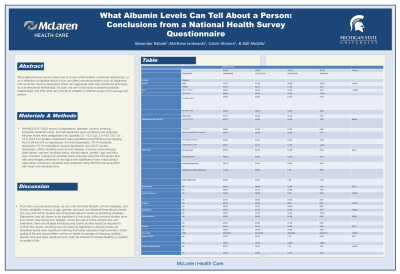Tuesday Poster Session
Category: Practice Management
P4903 - What Albumin Levels can Tell About a Person: Conclusions From a National Health Survey Questionnaire
Tuesday, October 29, 2024
10:30 AM - 4:00 PM ET
Location: Exhibit Hall E


Alexander Rabadi, MD
McLaren Health Care, Michigan State University
Flint, MI
Presenting Author(s)
Alexander Rabadi, MD1, Matthew Jankowski, MD1, Calvin Ghimire, MD2, Adil Abdalla, MD2
1McLaren Health Care, Michigan State University, Flint, MI; 2McLaren Flint Hospital, Flint, MI
Introduction: Hypoalbuminemia can be noted due to chronic inflammation, nutritional deficiencies, or as a reflection of appetite which in turn can affect neurotransmitters such as dopamine and serotonin causing depression which can aggravate what was mentioned previously as a bi-directional relationship. As such, we aim in this study to observe possible relationships and infer what can prelude to variation in albumin levels of an average US person.
Methods: NHANES 2017-2020 survey of depression, diabetes, alcohol, smoking, complete metabolic panel, and demographics were combined and analyzed. Albumin levels were categorized into quartiles Q1: < 2.5, Q2: 2.5-< 3.5, Q3: 3.5-< 4.5, Q4:4.5 or greater. Depression was quantified using PHQ9 scores ranging from 0-29 into 0-4 no depression, 5-9 mild depression, 10-14 moderate depression 15-19 moderate to severe depression, and 20-27 severe depression. Other variables such as liver disease, coronary artery disease, heart failure, cancers, smoking status, alcohol status, gender, age, and race were included. Categorical variables were analyzed using the Chi-square test with percentages presented in the figure and significance was noted using p-value while continuous variables were analyzed using ANOVA and presented with mean and standard error.
Results: As shown in Table 1.
Discussion: From this cross-sectional study, we can infer that daily lifestyle, chronic diseases, and human variability in terms of age, gender, and race can influence how albumin levels can vary and further studies can incorporate albumin levels as predicting variables. Depression was not shown to be significant in this study unlike previous studies done and neither was having liver disease. Given the nature of the sample size and timeframe, there are multiple limitations and further studies would be required to confirm the results. Smoking was not noted by significant in albumin levels yet education levels were significant inferring that better education might provide a better quality of life and hence better nutrition or better knowledge of choosing nutrition. Gender and race were significant and might be inferred to include disparity in nutrition or quality of life.
Note: The table for this abstract can be viewed in the ePoster Gallery section of the ACG 2024 ePoster Site or in The American Journal of Gastroenterology's abstract supplement issue, both of which will be available starting October 27, 2024.
Disclosures:
Alexander Rabadi, MD1, Matthew Jankowski, MD1, Calvin Ghimire, MD2, Adil Abdalla, MD2. P4903 - What Albumin Levels can Tell About a Person: Conclusions From a National Health Survey Questionnaire, ACG 2024 Annual Scientific Meeting Abstracts. Philadelphia, PA: American College of Gastroenterology.
1McLaren Health Care, Michigan State University, Flint, MI; 2McLaren Flint Hospital, Flint, MI
Introduction: Hypoalbuminemia can be noted due to chronic inflammation, nutritional deficiencies, or as a reflection of appetite which in turn can affect neurotransmitters such as dopamine and serotonin causing depression which can aggravate what was mentioned previously as a bi-directional relationship. As such, we aim in this study to observe possible relationships and infer what can prelude to variation in albumin levels of an average US person.
Methods: NHANES 2017-2020 survey of depression, diabetes, alcohol, smoking, complete metabolic panel, and demographics were combined and analyzed. Albumin levels were categorized into quartiles Q1: < 2.5, Q2: 2.5-< 3.5, Q3: 3.5-< 4.5, Q4:4.5 or greater. Depression was quantified using PHQ9 scores ranging from 0-29 into 0-4 no depression, 5-9 mild depression, 10-14 moderate depression 15-19 moderate to severe depression, and 20-27 severe depression. Other variables such as liver disease, coronary artery disease, heart failure, cancers, smoking status, alcohol status, gender, age, and race were included. Categorical variables were analyzed using the Chi-square test with percentages presented in the figure and significance was noted using p-value while continuous variables were analyzed using ANOVA and presented with mean and standard error.
Results: As shown in Table 1.
Discussion: From this cross-sectional study, we can infer that daily lifestyle, chronic diseases, and human variability in terms of age, gender, and race can influence how albumin levels can vary and further studies can incorporate albumin levels as predicting variables. Depression was not shown to be significant in this study unlike previous studies done and neither was having liver disease. Given the nature of the sample size and timeframe, there are multiple limitations and further studies would be required to confirm the results. Smoking was not noted by significant in albumin levels yet education levels were significant inferring that better education might provide a better quality of life and hence better nutrition or better knowledge of choosing nutrition. Gender and race were significant and might be inferred to include disparity in nutrition or quality of life.
Note: The table for this abstract can be viewed in the ePoster Gallery section of the ACG 2024 ePoster Site or in The American Journal of Gastroenterology's abstract supplement issue, both of which will be available starting October 27, 2024.
Disclosures:
Alexander Rabadi indicated no relevant financial relationships.
Matthew Jankowski indicated no relevant financial relationships.
Calvin Ghimire indicated no relevant financial relationships.
Adil Abdalla indicated no relevant financial relationships.
Alexander Rabadi, MD1, Matthew Jankowski, MD1, Calvin Ghimire, MD2, Adil Abdalla, MD2. P4903 - What Albumin Levels can Tell About a Person: Conclusions From a National Health Survey Questionnaire, ACG 2024 Annual Scientific Meeting Abstracts. Philadelphia, PA: American College of Gastroenterology.
